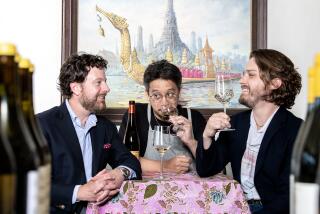While There’s No Stampede Yet, There’s a Cry for More Dry : Germany’s Bernhard Breuer Helps Dispel the Myth of ‘Sweet Is Good’
- Share via
A longstanding myth persists that German wines must be sweet to be good. Not so, claims Bernhard Breuer of the Rudesheim firm of Scholl & Hillebrand, which offers a well-made, bone-dry Rheingau Riesling from the exceptional vintage of 1985. Echoing the attitude of many top German vintners engaged in dry wine making, Breuer believes American white wine lovers will be attracted to the new style.
Notwithstanding that 45% of German wines are now produced in a drier style, Americans still cling to the more expensive, yet superbly sweet offerings of Auslese, Beerenauslese, Trockenbeerenauslese and the less frequently produced Eiswein. Bottles labeled as “ trocken “ (dry) or “ halbtrocken “ (semi-dry or off-dry), are virtually shunned.
Scholl & Hillebrand’s Riesling Dry, Qualitatswein, Rheingau, 1985, may not create a dry wine stampede but it will surely help dispel the myth. This has a clean, aromatically floral nose, with up-front fruit, yet a restrained and attractive, biting finish. It exemplifies a simple, forward, generous style found only in Germany. Crisp acidity enables the wine to be enjoyed with virtually any food, whereas the Riesling flavors, without a trace of sweetness, provide a tart delicacy in an elegant modern mode. It can also stand in as an exquisite, whet-the-appetite aperitif. Definitely it is a good value at $5.99.
A Dynamic Rheingau Force
Breuer, a dynamic Rheingau force at age 41, studied viticulture and enology at the Ecole Nationale Superieure d’Agronomie in Montpellier, France. He is a founding member of a regional group known as Charta, an association formed in 1984 to promote drier wines of the Rheingau, and create greater world acceptance, notably in the United States.
“Actually, we should name the association Magna Charta,” he jested, “as we want to free British and American wine consumers of their prejudice for German sweet wines only.”
Besides Breuer, other founding members are Graf Matuschka-Greiffenclau of Schloss Vollrads; Dr. Hans Ambrosi of Staatsweinuter Eltviller, and Dr. Helmut Becker of the internationally honored viticultural school and research station at Geisenheim.
Three 1985 Charta wines are in current release by Scholl and Hillebrand. Mittelheimer, Edelmann Riesling, QbA, only a tad sweeter than the Riesling, reflects greater texture and viscosity in a pleasant, higher acidity style. As a fine table mate, the greater texture here makes it easy to pair with fowl or meat dishes traditionally partnered with red wine. Alcohol, as for most Charta wines, is less than 11%, which makes the wine easily digestible even if served at late-night suppers. It is worthy of tasting at $7.90 per bottle.
Very fresh and fruity is Rudesheimer Berg, Roseneck, Riesling, QbA, Charta, 1985. Greater nose subtlety, a leaner texture and drier styled flavors qualify the wine for pre-dinner sipping or late-night supping. It also is priced at $7.90.
Best of Scholl and Hillebrand’s Charta wines, but more expensively tabbed at $16, is a beautifully styled Rudesheimer Berg, Schlossberg Riesling, Kabinett, 1985. A melon-like aroma is featured here with a soft, lean texture and a flinty taste. Higher in alcohol, at 11.5% the wine is in the drier style but may appear sweeter because of high fruit extract. This is the kind of wine that can be enjoyed for Sunday afternoon sipping, or for drop-in patio guests. Although the alcohol is higher, it is barely discernible, even after two or three glasses.
Founded in 1880 by partners Bernard Scholl and Albert Hillebrand, the firm was purchased at the turn of the century by Breuer’s grandfather, Peter, who set out to be a wine merchant exclusively. In subsequent years, with the acquisition of some of Rudesheim’s finest vineyards, the company now ranks as one of the better producers. Vineyards are held under the private domain name of Weingut G. Breuer. Assisting in the wine making is Breuer’s brother, Heinrich, thus enabling Bernhard to devote time to another love, writing about Rudesheim and its wines. He has written and edited the 11 volumes of “Vinothek der Deutschen Weinberglagen,” which won a 1983 Paris Literary Award.
The Charta group has become a strong organization numbering now more than 25 members, who are so keen on making their drier style work that they have designed a distinctive Roman Double Arch that is embossed on each bottle. They do not permit the wine to be shipped before the first day of June in the year after the harvest. Moreover, it must be estate bottled and approved by the association after sample tastings.
Breuer, also a founding director of the German Wine Academy, and his Charta associates may be on to something that may move entrenched Chardonnay and Sauvignon Blanc consumers to take a long look at--and a taste or two of--the Charta wines as a change-of-pace alternative.
“Wine taste habits die hard,” Breuer said, “but I believe our new style can stand on its own, provided Americans come to the glass with an open palate. We can blend into our wines the best virtues of Riesling, but how do we blend out the prejudice of ill-conceived taste myths?”
More to Read
Eat your way across L.A.
Get our weekly Tasting Notes newsletter for reviews, news and more.
You may occasionally receive promotional content from the Los Angeles Times.








